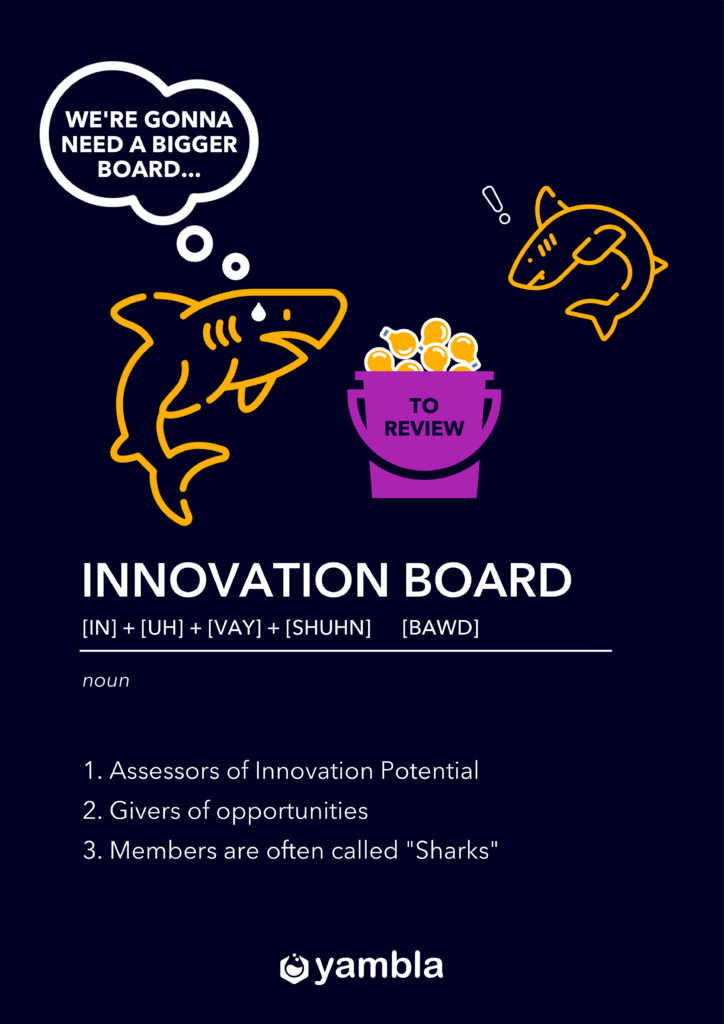In today’s fast-paced and ever-changing business landscape, innovation has become a cornerstone of success. To stay competitive and relevant, organizations are turning to a group of key individuals known as “Innovation Masterminds.” This group consists of diverse roles, each contributing significantly to fostering a culture of creativity and growth. Among these crucial roles stands the Innovation Board, a group of assessors, opportunity givers, and often referred to as “Sharks.”
Table of Contents
Amazing Innovation Board? Download your poster!
Download this poster and let it serve as a reminder that you’re part of an organization that values groundbreaking ideas and is committed to making them a reality!

Assessors of Innovation Potential
At the heart of innovation lies the ability to identify and nurture potential breakthroughs. This is where the Innovation Board excels. They serve as the discerning assessors of innovation potential within the organization. With a keen eye for spotting promising ideas, they evaluate concepts and initiatives for their feasibility, impact, and alignment with the company’s goals.
Much like a panel of judges, the Innovation Board uses their expertise to determine which innovations have the greatest potential to drive the organization forward. Their role is not just to criticize but to guide, providing constructive feedback and insights to help refine and develop ideas into actionable plans.
Here’s how:
Role of the Innovation Board
- Initial Screening: The Innovation Board reviews and screens submitted ideas to ensure they align with organizational goals, values, and strategies. They act as a first filter, helping to discern which ideas are worth further exploration and which are not.
- Resource Allocation: The board is responsible for allocating the necessary resources—money, time, and manpower—to bring the most promising ideas to life.
- Evaluation Criteria: By developing a structured set of criteria to judge the potential of innovative projects, the board ensures a fair and balanced evaluation process. These criteria can include things like feasibility, ROI potential, alignment with corporate strategy, and market demand.
- Technical & Market Assessment: The Innovation Board often comprises members with diverse skills and experiences, enabling a multi-faceted evaluation that considers both technical feasibility and market viability.
- Risk Assessment: Part of the board’s role is to assess the risks involved in pursuing an innovative project, weighing them against the potential benefits.
- Progress Monitoring: Once a project is approved, the board continues to monitor its development, providing oversight and making adjustments as necessary.
Benefits to Ideas and Innovators
- Focused Implementation: With the board’s guidance, resources are allocated effectively, ensuring that good ideas have the best chance of becoming successful projects.
- Feedback Loop: Innovators receive constructive feedback throughout the process, aiding in the refinement and potential pivoting of the idea. This ensures that the idea matures before reaching the execution stage.
- Alignment with Organizational Goals: Ideas that pass the board’s scrutiny are more likely to align with the organization’s long-term strategy, ensuring support from other departments and higher management levels.
- Credibility: Board approval provides a certain level of validation and credibility to the innovator’s idea, making it easier to secure further resources and buy-in from stakeholders.
- Cross-Functional Insight: Because innovation boards typically include members from various parts of the business, ideas are vetted from multiple perspectives, enhancing their robustness and viability.
- Accelerated Time-to-Market: With a dedicated focus from the Innovation Board, the time from idea generation to market launch can be significantly reduced.
- Risk Mitigation: The board’s involvement provides a safety net, helping to avoid the pitfalls that can doom an otherwise promising project, thereby reducing waste of resources.
- Fosters a Culture of Innovation: The very existence of an Innovation Board can encourage more employees to think creatively, secure in the knowledge that their ideas will receive a fair and thorough evaluation.
- Motivation and Reward: Knowing that there is a dedicated board to assess and reward innovation can serve as a strong motivator for employees to think creatively and contribute their ideas for organizational improvement.
By serving as assessors of innovation potential, Innovation Boards play a critical role in shaping the innovation landscape within an organization, helping to foster a culture that values and nurtures new ideas while ensuring alignment with broader organizational objectives.
Givers of Opportunities
Innovation is not a solitary endeavor; it thrives in an environment where opportunities abound. The Innovation Board acts as the gatekeepers of these opportunities. They have the power to provide resources, funding, and support to transform innovative ideas into reality.
By offering these opportunities, the Innovation Board empowers employees and teams to bring their creative visions to life. They ensure that promising concepts receive the backing they need to evolve from concepts on paper to tangible solutions that benefit the organization.
An Innovation Board plays a unique and crucial role in organizational dynamics that extends well beyond simply evaluating the potential of new ideas. Here’s how:
Role of the Innovation Board
- Talent Identification: One of the key roles of the Innovation Board is to identify individuals with high potential for innovative thinking. These are the people who not only have great ideas but also the ability to see them through to fruition.
- Pilot Programs: The board can create and oversee pilot programs to test out promising ideas on a smaller scale. This allows innovators to prove the concept without risking large-scale failure.
- Networking: Members of the board can use their internal and external networks to connect innovators with mentors, industry experts, and other resources that could help move an idea forward.
- Skill Development: The board can offer or facilitate workshops, training sessions, or other educational opportunities to help employees refine the skills needed to bring an idea to life.
- Cross-Departmental Collaboration: By creating opportunities for cross-departmental projects, the board can help innovators find the expertise and resources they need to implement their ideas effectively.
- Funding: Whether through internal grants, budget allocation, or external fundraising, the Innovation Board can provide the necessary financial support to get a project off the ground.
- Career Advancement: Recognition from the Innovation Board can lead to career opportunities for the innovators, such as leading the project they proposed, or even progressing to higher roles within the organization.
- Spotlight on Innovation: The board often has the authority to publicize successful projects internally and externally, thus giving innovators a platform to share their achievements and gain recognition.
Benefits to Ideas and Innovators
- Career Development: Being recognized by the Innovation Board can be a significant milestone in an employee’s career, opening doors to new roles and responsibilities.
- Resource Access: Innovators are more likely to receive the resources they need (financial, human, time) when a dedicated board is actively creating opportunities for them.
- Skill Enhancement: The training and mentorship opportunities provided by the board can be invaluable for personal and professional development.
- Multi-Disciplinary Input: Innovators benefit from the broad range of expertise offered by board members, which can help refine and improve their ideas.
- Visibility: Gaining the attention of the Innovation Board often means gaining visibility across the organization, which can attract more support and resources for an idea.
- Accountability and Support: The ongoing oversight and support of the Innovation Board can help keep projects on track, ensuring that they meet their milestones and achieve their objectives.
- Empowerment: Knowing that there is a formal path for idea evaluation and implementation empowers employees to think creatively and take risks.
- Peer Recognition: Success stories that are publicized by the board can lead to peer recognition, which can be highly motivating and contribute to a positive organizational culture.
- Learning from Failure: Even if a project doesn’t succeed, the structured framework provided by the Innovation Board ensures that lessons are learned and applied to future endeavors.
As “Givers of Opportunities,” an Innovation Board not only evaluates the merits of new ideas but actively works to create the conditions under which those ideas—and the people behind them—can flourish. This comprehensive approach enriches the innovation ecosystem within an organization, providing both tangible and intangible benefits that drive long-term success.
The “Sharks” of Innovation
The term “Sharks” is often used to describe the members of the Innovation Board, drawing an analogy to the high-stakes environment of venture capital and TV shows like “Shark Tank,” where entrepreneurs pitch their business ideas to a panel of potential investors, also known as “sharks.”
Like the show’s investors, the Innovation Board members are known for their shrewd assessment of innovation projects. They play the role of critical evaluators who are looking for high-potential ideas that can deliver real value to the organization. They are expected to ask tough questions, scrutinize plans rigorously, and make hard decisions about which innovations to back.
While the term carries an edge of toughness and perheps even intimidation, it also implies that these members have the experience and resources to recognize and nurture innovative ideas. It is important to acknowledge that their role is not to intimidate but to inspire and facilitate.
Much like the entrepreneurial “Sharks,” they are driven by a desire to see innovation thrive. They understand the risks and rewards associated with innovative ventures and are willing to dive into the waters of uncertainty to support and champion promising ideas.
The involvement of “sharks” can add a level of rigor and credibility to the innovation process, helping to ensure that only the most viable ideas receive the green light.
Do you thick all the boxes?
In conclusion, an effective Innovation Board helps ensure that promising ideas and enthusiastic innovators make the most of the time and resources they’re given, driving the organization toward a successful and innovative future.
Don’t wait for the ‘perfect time,’ you will wait forever. Always take advantage of the time that you’re given.
Daymond John – CEO and founder of FUBU and investor on Shark Tank
It serves as a critical mechanism within an organization to foster, evaluate, and implement new ideas. Acting as “Assessors of Innovation Potential,” the board members rigorously scrutinize each idea’s feasibility, alignment with organizational goals, and market viability.
When they don the hat of “Givers of Opportunities,” their role extends beyond evaluation to actively facilitating the resources, mentorship, and conditions necessary for innovation to flourish.
Sometimes referred to as “sharks,” these board members add a layer of critical acumen and experience to the innovation ecosystem, thereby ensuring that only the most promising ideas get the green light. Their multifaceted role is instrumental in nurturing a culture of innovation, driving long-term organizational success, and empowering employees to be more creative and take risks.
So, are you ticking all the boxes? Whether you are an organization contemplating the creation of an Innovation Board or an existing board looking to maximize your impact, it’s essential to consider whether your board is functioning effectively in its dual role as both assessors and facilitators of innovation. Are you creating a fair and robust evaluation framework? Are you actively giving opportunities and resources to innovators? And finally, are you and/or your board members bringing the level of rigor and critical scrutiny worthy of being called “sharks”?



